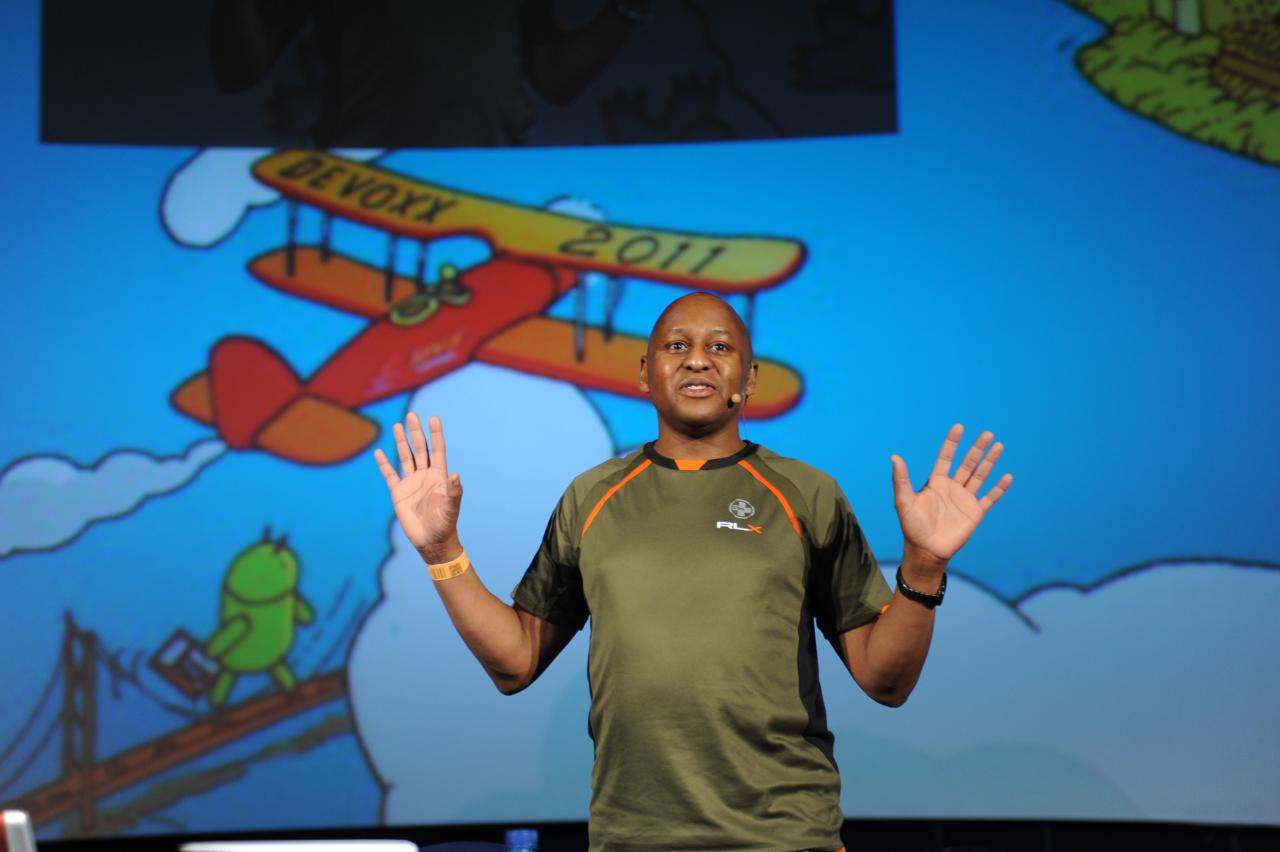Devoxx 2016 Part 1 – Conference Impressions
17 November 2016 Comments off
Reading time:
8 minutes
Word count:
1662
This is my report on my trip to Devoxx Belgium conference. My last visit to Belgium coincided with the publication of Java EE 7 Developer Book in 2013. Three years ago is long time in the technology. So what has changed in Belgium in the meantime? The threat level of security is the obvious thing, there were many army soldier patrols in Antwerp and elsewhere in the nation. However there is no interruption whatsoever as the ordinary citizen went about their daily business.
When I arrived at the Antwerp Kinepolis#1 on Monday to register and pick up badge. As I pushed the outer door there was an G4S security guards, and they asked to check inside my laptop bag and camera bag. I will also say in the UK, we see often armed police and soldiers patrols at the airports, train stations and busy port, especially, when there are periods of higher than normal threat levels.
Impressions
The format of the conference was mainly better than I how I remembered it. There are two university days followed by two and half days of conference day. It seems to me there were similar size of the conference to yesteryear. There were lots of attendants, and queues to several session. There heavy queues of waiting people outside of Venkat Subramanian talk, Reactive Programming. There several sessions that were full very quickly. People wanted to hear about Java 9 tooling, machine learning and also general web technology such CSS and Flexbox.
Inspirations
My inspiration was Hubert Sablonniere‘s talk on CSS Flexbox. I liked this talk, because of the real world and instant demonstrations. I am reminded of the Bret Victor’s video online called Inventing on Principal. I believe the best software development experiences especially are iterative, creative and empirical.
My second inspiration was TypeScript and AngularJS 2.0 talk by Antonio Goncalves and Sébastien Pertus. You might think it is weird for Java and Scala software engineer to be intrigued by what is essentially front-end technology, which is the type of skill for an Interface Developer. Unless you have ever worked inside a Digital team, then it might be lost on you, because so much of the success of server side developer rests with the emotional intelligent understanding and feeling of working with a top HTML5/JavaScript/CSS coder. Just comprehending the difficulties of what your work mate or colleague is fighting, makes you look good and approachable in a team. I have heard the term “mechanical sympathy” in a performance tuning situation, how about a new team “engineering people sympathy”Antwerp Kinepolis#2 .
On the subject of performance engineering, It was an absolute pleasure to hear the legendary Cliff Click give two great talks on Java. I thought these two rare talks for any conference in Europe set Devoxx apart from even JavaOne, San Francisco.
I also was impressed by the attendance in the Microprofile talk. I felt that the audience were appreciative of the new initiative in Java EE. As David Blevins, repeated that the initial JSRs were deliberately restricted to JAX-RS, CDI and JSON-P in order to get something out of the door. Andy Gumbracht, also of Tomitribe, help put the sample application together with the other Java EE providers including IBM, Payara and Red Hat. You should got a check it out and build the software yourself at Microprofile.io.
It was a heart warming that Paul and Gail Anderson were pushing the JavaFX user interface story onto Mobile devices and beyond. Indeed, their university talk was the first session I reached for at Devoxx. It is reasonably straightforward to build a JavaFX application that targets iOS and Android and that something is good, since I was last involved with JavaFXAntwerp Kinepolis#3 .
Disappointments
I was disappointed by some of the delivery of a few talks. The talk on Swift on the server side cloud started very slowly, I thought it required a bit more funk, spice and the introduction level could have been faster. I watch a Scala talk about Adoption and again the pace was a little slow. There needed to be part where the speaker would cut to the chase and the main point faster. The quality was good, but it could have been a lot better with more edits and independent review of the material.
Improvements
Unfortunately, I tried the conference official food on Monday. I choose the chicken salad. I couldn’t eat the other choice. I had to bail for the rest of the week to the Quick burger restaurant just around the corner. So the food is still the same quality. I suppose there is always an underside. I would rather accept the lack of food as trade off for the high quality of technical sessions, the location in Europe and, of course, the knowledgeable people who attend this fabulous conference.
Directions
These were the future directions:
- Machine Learning
- Ratification of Micro-Service Oriented Architecture (M/SOA) interest
- Web technology beyond Java that includes frond-end technology
- Increasing interest about Java 9 and modularisation
Community Stuff
The closing keynote took place on Thursday evening and it was the Java Council podcast. During the entertaining hour, Simon Maple with the help of Bruno Souza put together a tribute to the fellow Java Champion, Daniel deOliveira. He died from an heart attack a week before. Simple asked the attendances all to stand for a minutes applause just like the Italian football fans do. It was a moving tribute to a determined man, who had he lives on to an old age, could have been ultimately Java’s greatest ever pedagogist. Daniel Oliveira was helping and studying with Michael Koelling at Kent University #4 in south east England, when he unfortunately left these shores and set sail to the West.
If you are interested in donating and helping Luci, Daniel’s wife come to terms with her loss. Please visit the memorial web site for Daniel deOliveira.
I also attended the Java Community BOF on Thursday night, which was hosted by Patrick Curran, who is chair of the Java Community Process. I was really glad that there were new faces here, who might become JCP members. It is now easier to become a JCP Associate member as an individual. Of course, Patrick Curran told us that it was best to do this through a Java User Group. He has had an interesting opinion on the march of the robots, artificial intelligence and machine learning. Could we as developers, designers and architects be facing in our lifetime commodification issues around general programming? Hmm … Who knows see also this Quora question: will computers be able to program themselves in the future?.
Schedule
I attended the following session in sequential order:
Monday
Java on Mobile : Write once, Run on iOS & Android – Paul and Gail Andersen
Java 9 Modularity in Action – Sander Mak and Paul Bakker
Make CSS Fun Again with Flexbox! – Hubert Sablonnière
Easily secure your Front and back applications with KeyCloak – Sebastien Blanc
Tuesday
Java EE, TypeScript and Angular2 – Antonio Goncalves Sébastien Pertus
Exploring Java 9 – Venkat Subramaniam
Javaslang – Functional Java Done Right – Grzegorz Piwowarek
What can you learn from thousands of source files in Github? – Guillaume Laforge
Wednesday
Twelve Ways to Make Code Suck Less – Venkat Subramaniam
Sharing 2 years experience using Scala in a real project by a Java team – Joost den Boer
Get started writing TypeScript today! – Dominik Kundel
Deep Dive into JUnit 5 – Sam Brannen
BOF Microprofile.io: An open community discussion – David Blevins, Heiko Braun, Alasdair Nottingham, Mike Croft
Thursday
Javaslang – Functional Java The Easy Way – David Schmitz
Introducing the MicroProfile – David Blevins, Andy Gumbrecht, Alasdair Nottingham, Heiko Braun, Mike Croft
A Crash Course in Modern Hardware – Cliff Click
Machine Learning for Developers – Danilo Poccia, Sebastien Stormacq
Zen & The Art of Angular 2 – Igor Minar
Swift: the mobile language that’s coming to the cloud – Ian Partridge
A JVM does That? – Cliff Click
BOF More Java Community Insider Secrets! – Yolande Poirier, Cassandra Clark, Martijn Verburg
Friday
CDI 2.0 is upon us – Antoine Sabot-Durand
ScreenPlay: the next stage in automated acceptance testing – John Smart Jan Molak
Conclusion
Congratulations to Stephan Janssen and the entire Devoxx Belgium team for another year and continuing this conference for the fifteenth year.
The End


